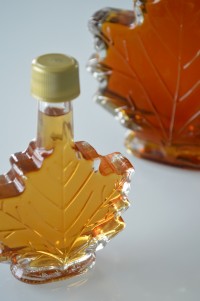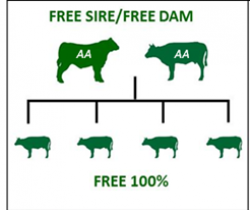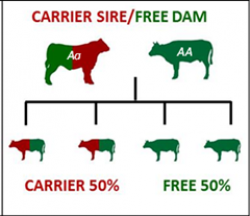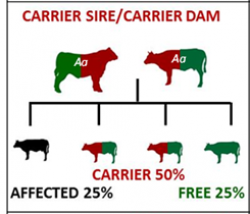Maple Syrup Urine Disease (MSUD)
Are you looking for Zebras?
This page is solely dedicated to the topic of Maple Syrup Urine Disease in Herefords. This came to light early in March 2019 by way of Black Hereford breeders asking if the lab (Neogen) could help them find an answer as to where MSUD came from in their cattle. The answer was that it came directly from the Hereford side of the heritage. The AHA rule book even lists it as a known genetic defect and lists it in the lethal category.
Upon learning of the problem in Black Herefords and realizing that GeneSeek had already captured the information for the MSUD defect in AHA owned samples previously tested during Fall 2014-Fall 2017 the association authorized all qualifying samples to be analyzed. The initial test group was approximately 33,000 animals and resulted in 276 carriers being identified. Making the occurrence 0.836% of carrier cattle identified from the test group. Out of the 276 carriers 15 were minis, making the occurrence in minis among the test group 5.435%. (The 15 minis were broken down into three groups: 7 were horned with no polled blood, 3 were horned with some polled blood, 5 were polled with some horned blood.) The best question is how many of the original 33,000 were minis so we know if our statistics are tracking along with the rest of the breed.
The part that might upset some breeders is the owners of calves produced by carrier cattle were not notified of this new result, nor were the owners of the Sire and Dam that produced the carrier animal. You could have the full sibling to a known carrier, the parent of a carrier or the offspring of a carrier and be completely unaware. All of these situations would have a 50% likelihood of detecting carrier cattle upon testing. It’s as simple as a coin toss.
The gene is a simple autosomal recessive, meaning that 50% (half) of the offspring from a carrier should inherit the faulty MSUD gene. Carriers (MSUDC) are said to be unaffected by the disease. It's when two faulty MSUD genes are inherited that a calf shows outward symptoms of the disease. The calves become lethargic and unsteady by 2-4 days of age, most are recumbent (unable to stand) by 3-5 days and dead by day 7-10. The problem lies with a metabolic pathway that cannot correctly break down the proteins in milk. These proteins then buildup to toxic levels and cause brain damage and liver damage until the calf succumbs. There are no medications or therapies that can reverse this process available at this time. Thiamine can help protect the brain but it can’t stop the process and every swallow of milk brings in more protein the calf can’t metabolize.
Your vet will likely diagnosis the death as one of two things, neither of them are MSUD:
1. Meningitis
2. Bacterial septicemia
It's highly likely that the urine will not exhibit the odor of Maple syrup for which the condition is named. Using this as a diagnostic criteria is flawed and should be avoided. Brain or liver samples sent to a diagnostic lab won’t typically get you the MSUD diagnosis either because vets aren’t looking for it, labs aren’t looking for it and to date there is only ONE lab in the country that can definitively test for it, GeneSeek owned by Neogen. So breeders could have been seeing this for years and not known what was right in front of them until now. The earliest the DNA test was available to the public was March 6, 2019. I think as we move forward as informed breeders we will see the number of carriers rise, level off and then start to dwindle as breeding choices are made to select non-carriers (MSUDF.) This is the same as it was for the IE, DY, and HY traits previously tested.
DNA testing is the ONLY method of screening and diagnosis at this point in time. If you have a suspect calf born take a TSU, blood or ear notch sample ASAP and store it until you can get the tests ordered through GeneSeek. If you have a calf that becomes clinical remember your vet will not be thinking MSUD because he’s looking for horses not Zebras. It’s our job as Hereford breeders to be informed and help educate them about our Zebras.
Breeders we spoke with had been misinformed in general as to which cattle to test or how the inheritance worked but are fairly unified in how they plan to handle MSUDC bull calves. Castration was the overwhelming answer and only allowing MSUDF bull calves to mature to breeding age intact. This may or may not be how you chose to handle your herd moving forward. Having a good long chat with your Vet and fellow breeders would be wise. It’s the females that divided the group and gives a unique answer from each. Some will plan on culling any MSUDC offspring of either sex while others will continue along without changing their breeding methods. This makes it important to have this conversation with the breeder you are buying breeding stock from and the results of the testing much more important. Each buyer should go into a purchase fully informed and aware of any carriers in the pedigree, so a quick check of herfnet is imperative because registration papers are not reprinted when a DNA result comes back. If you don’t see either MSUDC or MSUDF then the animal was NOT tested for the disease. The AHA will not declare cattle “free by pedigree” so if you have any questions you can always call the association and ask as many questions as you need. The staff are really nice and very patient.
At the present time there is no research being done on this disease and no urgency due to it’s perceived rarity. However, in humans the research is there and it’s assumed to behave the same in humans and cattle. This allows anyone that can wade through the material to gain a much better understanding about the details of the disease. Youtube has several patient education videos about MSUD which can give a really good general explanation to anyone that watches. The interesting part of the human research is that there are different levels of severity in MSUD and it’s quite possible this could be the same in cattle. Yet, without further research we may never know the answer.
You should be leery of any breeder that isn't taking this defect seriously. You can't find something where you don't look, so if anyone has told you to only test your polled bulls you need to know they clearly aren't up to date on this topic. Old research is not current and the test data simply doesn't support the idea of horned vs polled. Testing only polled animals will find the defect in polled cattle, just the same as testing horned animals will find the defect in those lines as well. There are breeders testing for this and non-carrier cattle can be found for sale with a little searching.
The more cattle that are tested the more breeders learn about where the possible defect came from and what bloodlines are known to produce carriers. The only way to stay up to date on this topic is to keep cheeking the carrier report as often as possible. The first link below can run the report in a single click, if you are a member using the authorized user side will give you a more powerful database pull with progeny records. Reading the report and knowing which are the minis takes a trained eye but it's not a hard task to learn with a little time and a cup of coffee on a rainy day.
5/8/2019 As of today 392 carriers have been identified by the DNA test:
25 are minis
13 are horned with NO POLLED BLOOD
5 are horned with polled blood
7 are polled with horned blood
3 more animals have produced MSUDC calves when mated to MSUDF cattle making them carriers yet unidentified. All of these are horned with no polled blood.
7/15/2019 As of today there are 499 carriers and 31 are minis with several more carriers yet untested (produced MSUDC calves when mated to MSUDF animals.)
It should be noted that the AHA has not indicated which cattle to test, they are recommending the only way to know is to test bulls and cows irregardless of horn/poll status.
Good luck, we are all in this together!
MSUD Links:
- AHA genetic abnormality main page. You can see the four known defects and even run the carrier report with a single click. https://hereford.org/member-services/herd-management-tools/genetic-abn/
- AHA DNA testing information (how to order, how to take a sample and how to understand your results.) https://hereford.org/genetics/dna-testing/?tab=understanding-results
- AHA rules and forms. Page 7-8 cover genetic disorders, carrier cattle identification, classification and breeding selection. https://hereford.org/member-services/register-an-animal/rules-forms/
- MSUD explained, a letter from the AHA's Shane Bedwell. https://hereford.org/wp-content/uploads/2019/04/0419_PerformanceMatters.pdf
- Human patient education about MSUD in humans https://rarediseases.org/rare-diseases/maple-syrup-urine-disease/
- Earliest and best study of the Canadian herds and Australian herds indicating the defect was in horned and polled lines. https://www.ncbi.nlm.nih.gov/pmc/articles/PMC1680602/pdf/canvetj00584-0081.pdf




